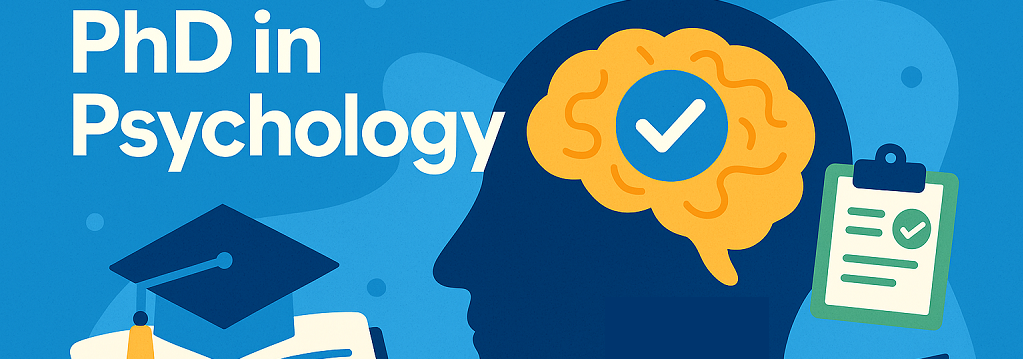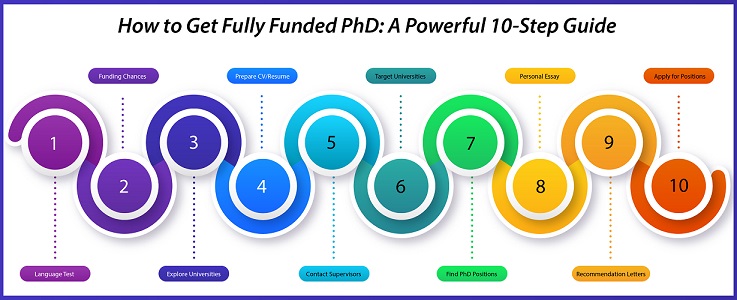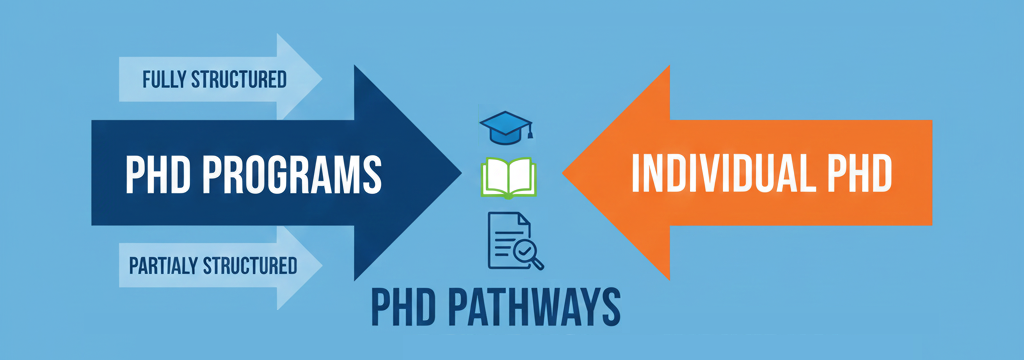
A PhD in psychology is a transformative experience that blends rigorous academic research with personal growth. People with this advanced degree can conduct creative research, study the human mind, and contribute to creating solutions for mental health problems. For those who are passionate about behavior analysis, a PhD in psychology offers a structured but adaptable path to mastery. It is more than just a degree; it is a commitment to comprehending the complexities of the psyche. You can prepare for a range of careers with this psychology doctorate, including clinical practice, research, and teaching. However, the path requires dedication, tenacity, and a clear plan. This blog will guide you through the essentials of developing a fruitful psychology PhD program.
Why Choose a PhD in Psychology?
The Value of a PhD in Psychology in Today’s World
A PhD in psychology is a prestigious degree that signifies expertise, dedication, and a profound understanding. In a society where mental health and well-being are becoming increasingly important, people with this degree are valued as thought leaders, counselors, and change agents. Their observations and PhD research have a significant impact on the future of psychology and public policy. Behavioral science PhD holders can work in academic institutions, clinical settings, and organizational consulting, among other places. They might influence mental health laws and fund innovative psychological research that helps individuals, communities, organizations, and society as a whole.

Pursuing a doctorate in psychology fosters deep intellectual curiosity and the ability to assess complex psychological concepts. To produce knowledge that informs real-world applications in therapy, education, healthcare, and the workplace, students research subjects like social behavior, emotional control, cognitive psychology, and neuroscience. In addition to helping people succeed professionally, a PhD in psychology allows them to make a substantial contribution to society. Doctorates in psychology work to make the world healthier and more educated through research, teaching, advocacy, and therapy. Their efforts improve overall psychological well-being and strengthen mental health support.
Career Opportunities with a Doctorate in Psychology
Psychologists with doctorates make competitive salaries, particularly in specialty fields like neuropsychology, clinical psychology, health psychology, academic research and teaching, and consulting. Beyond financial benefits, their expertise has a direct impact on policy decisions, treatment approaches, and mental health procedures, making their contributions to communities, professional associations, and individuals invaluable.
Clinical psychologists work one-on-one with patients to assess, diagnose, and treat mental health conditions using research-based methods. They provide treatment, conduct psychological assessments, develop intervention strategies, and collaborate with other medical professionals to enhance overall health and foster long-term mental health stability. Many PhD graduates choose to pursue careers in academia, where they conduct extensive research and train the next generation of psychologists. In addition to publishing scientific research and mentoring students, they oversee academic programs and contribute to the development of new psychological theories and evidence-based practices.
Organizations turn to PhD psychologists for insights into employee mental health, leadership dynamics, and workplace efficiency. Organizational psychologists help companies create healthier, more productive workplaces that boost employee engagement and performance by researching team dynamics, diversity, motivation, and job satisfaction. Forensic psychologists apply psychological concepts to legal matters while working with law enforcement, courts, and correctional facilities. By assessing criminal behavior, providing expert testimony, assisting in jury selection, and developing rehabilitation programs for offenders, they guarantee the just and effective operation of the legal system.
The Journey to Earning a PhD in Psychology
Structure and Duration of PhD Programs in Psychology
A full-time doctorate in psychology typically takes three to six years to complete, depending on the country. Its curriculum blends research, practical training, and coursework (usually for a PhD in USA and a PhD in Canada). Foundational theories are prioritized in the early years, while dissertation work is prioritized in later stages. PhD candidates can fully comprehend psychological science thanks to this framework. Full-time students may complete their doctorate in psychology more quickly than part-timers, who balance their studies with other commitments. Milestones like qualifying exams, research proposal defense, PhD dissertation, and PhD viva serve as indicators of your progress. The skills required for a career based on a PhD in psychology are developed at each stage.

Choosing the Right Psychology Specialization for PhD
A PhD in psychology can be earned in a variety of specializations, including clinical, forensic, developmental, and cognitive psychology. If you pick the right focus, your education will align with your long-term career objectives and interests. A career in forensic psychology might be driven by an interest in human behavior in legal situations, whereas a desire for mental health treatment might lead one to clinical psychology. If you are interested in learning styles and child development, the developmental psychology course might be ideal for you. For those who are interested in workplace behavior and efficiency, industrial-organizational psychology is an alternative.
Making the right choice ensures rewarding work and important contributions to the field. Examining program resources and faculty expertise is crucial when selecting a specialization. Your academic experience will be enhanced by finding a supervisor who shares your research interests, as mentoring is crucial. Early specialization (better to be when applying for the PhD programs) gives your academic path direction and aids in the development of a unique professional personality. Whether you focus on neuropsychology, social psychology, or health psychology, becoming an authority in a particular area makes you stand out. This chosen specialty promotes deeper research, better job opportunities, and a more robust professional network.
Prerequisites and Admission Requirements
Planning is essential when beginning a PhD program in psychology. Most PhD programs require a master’s degree in psychology or a related field. You should maximize your master’s achievements for PhD application success. Having a solid academic record, research experience, and letters of recommendation is crucial. Admissions committees seek candidates who show promise and enthusiasm for a PhD in psychology. A strong personal essay and results from language tests such as the GRE, IELTS, and TOEFL iBT are required. This is your chance to discuss how a psychology PhD aligns with your goals. The foundation for an application’s acceptance is laid by meeting these requirements. Being prepared is crucial if you want to stand out in a crowded pool.

Mastering Research and Writing Skills
Research is the foundation of a PhD in psychology, and establishing credibility in the field calls for a strong research portfolio. You will organize research, collect and analyze data, and publish findings, i.e., skills that are essential in both academic and real-world settings. Gaining expertise in these areas requires effort, from creating engaging concepts to effectively applying complex statistical tools (such as t-tests, ANOVA, and regression analysis) and research techniques. Conducting independent and collaborative research, presenting findings at conferences, and publishing in peer-reviewed journals all enhance your academic reputation. This portfolio showcases your expertise and increases your chances of getting a postdoc and academic job.
Writing is one of the most crucial abilities for a PhD in psychology. For your research articles, dissertation, and (possible) grant applications, precision, organization, and clarity are crucial. Regular practice with writing assignments, conference abstracts, and literature reviews improves your ability to communicate complex ideas. Constructive criticism is an essential part of academic writing and research. You can refine your arguments, improve your methods, and gain more clout by interacting with peers, research supervisors, and journal reviewers. Embracing criticism ensures that your work will be valued by the PhD community in psychology and contribute significantly to the field.
Post-Graduation
Recall that earning a PhD in psychology marks the start of ongoing development rather than its conclusion. Since the field is always changing, you can stay up to date by reading publications, attending conferences, and enrolling in relevant workshops. You can contribute to this because you have a doctorate in psychology. Always remember that your influence is fueled by lifelong learning. A PhD in psychology brings benefits that go beyond your interests. Your work affects people’s lives, whether it is through improving therapy or influencing policy. Current and future PhD students in psychology will be motivated to follow their dreams by your journey.
Overcoming Challenges in a PhD in Psychology
Managing Time and Stress
A PhD in psychology is a demanding program that usually calls for juggling coursework, research, teaching, and personal commitments. Developing effective time management skills is essential to sustaining productivity and preventing burnout. Setting deadlines, planning your tasks, and using productivity tools can help you maintain equilibrium. Establishing a daily or weekly routine ensures steady progress without feeling overworked. Breaking down large tasks into smaller milestones makes projects easier to manage and less stressful. Motivation is maintained by keeping track of progress in task lists on notebooks or management mobile apps. Consistent progress free from unnecessary stress is made possible by realizing that a PhD is a journey rather than a race.
Stress is inevitable when pursuing a PhD in psychology. Meeting deadlines, publishing, and performing well can all be stressful. Recognizing stressors and practicing relaxation techniques like mindfulness, exercise, or hobbies can improve well-being. Productivity and mental toughness are enhanced by effective stress management. Navigating the challenges of a doctorate is made easier with a strong support network. Developing relationships with mentors, classmates, academic advisers, or mental health counselors provides guidance and support. When times are difficult, asking for help prevents people from feeling alone and increases resilience. Having a supportive community can help you succeed during your PhD studies in psychology.
Securing Funding and Financial Supports
It can be very challenging to finance a doctorate in psychology. Tuition, research costs, conference travel, and living expenses all add up. While putting in the time required for their studies, many students find it difficult to make ends meet. Understanding the available funding options is the first step towards financial security. Many PhD programs offer research, teaching, or graduate assistantships to help cover costs. These programs provide financial assistance while enhancing the professional and academic experience. Applying early and highlighting your qualifications will increase the likelihood of receiving institutional support, making your PhD path more sustainable. Check out our articles on fully funded PhDs and fully funded scholarships for international students.

Conclusion
Pursuing a PhD in psychology is more than an academic endeavor. It is indeed a life-defining journey toward personal growth, societal impact, and professional excellence. While the path is demanding, it offers unmatched opportunities for intellectual exploration, career advancement, and meaningful contribution to mental health and behavioral sciences. From selecting the right specialization to mastering research and managing stress, each step requires dedication and strategic planning. By understanding the process and preparing thoughtfully, aspiring psychologists can enhance their admission prospects and thrive throughout the program. Whether in clinical practice, academia, or consulting, psychology PhDs play a vital role in shaping a healthier, more informed society.











Leave Your Comment